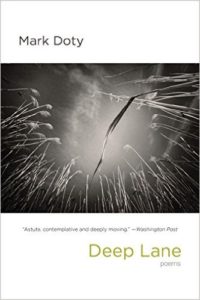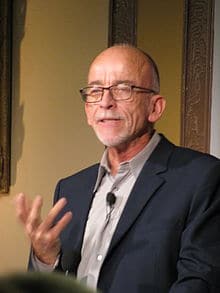
Of the 36 poems in Deep Lane by Mark Doty, nine of them are entitled “Deep Lane.” So if you asked me which poem is the title poem for the collection, I would have to say, “Yes.”
Perhaps all nine are. Perhaps all nine should be.
As I read these poems, certain words kept coming to kind. Quiet. Beauty. Defined. Precise. Distance.
“Distance” is something of the odd man out here. Doty observes, even when he talks of family, or relationships. He watches, and he watches carefully. It’s rare to find him a participant in what he’s describing, and when he is, such as in the poem “Apparition, ” he still exhibits a strong sense of distance.
Apparition

from forsythia I’ve cut in the front garden,
starting to set them into the low thick glass vase,
and my father says, Mark is making the house pretty.
He didn’t speak to me the last five years of his life;
why should I be surprised he’d use the third person now?
Though he did make sure I heard him, didn’t he—
he did say my name so that I could hear him,
and I think it was in gentleness, a compliment, and not in mockery.
It’s a simple poem, but it’s packed with meaning and questions. A boy or young man is standing at the kitchen sink, arranging flowers he’s cut in the garden. His father makes the only spoken statement; his mother is never referred to in the poem. We’re not even sure whether his father is speaking to anyone but Mark, or whether anyone else is around. He notes his father used the third person, which suggests that his father, no matter what the meaning of the words, is making the comment impersonal, yet potentially wounding. His father speaks his name, true, making sure Mark took notice, but whether it was a compliment or in mockery is unknown. Mark, himself unsure (“I think”), chooses to take it as a compliment.
The poem goes beyond the idea of distance between a father and a son; it suggests alienation. I should point out that the poem is one of three in collection with the title “Apparition.”

Mark Doty
The poems address an array of subjects, including the poet Robinson Jeffers, the painter Jackson Pollock, family relationships, a deer on Fire Island, the beauty of a tattoo, and more. But each contains the sense of distance—and it’s emotional rather than physical distance.
What this poem does not have (and many of the poems in Deep Lane share this omission) is any sense of passion. Anger has passed, leaving resignation and possibly a quiet bitterness, and acceptance, in its wake.
Doty, born in 1953, is the author of some 12 collections of poetry and six nonfiction works. Many of poetry works are about sexual identity. His awards include the National Poetry Series prize, the National Book Critics Circle Award, the Los Angeles Times Book Prize, the T.S. Eliot Prize, and the Whiting Award, among others. He also received a Guggenheim Fellowship. He won the National Book Award for Poetry for Fire to Fire: New and Selected Poems (2008).
Just as there many poems entitled “Deep Lane” in the collection, there are many levels of depth. Perhaps that is the idea of Deep Lane—one title, different poems, different meanings, all using the same title to effect a kind of connectedness.
Photo by Konrad Jagodzinski, Creative Commons, via Flickr. Post by Glynn Young, author of the novels Dancing Priest and A Light Shining, and Poetry at Work.
__________________________

“I require all our incoming poetry students—in the MFA I direct—to buy and read this book.”
—Jeanetta Calhoun Mish
- Poets and Poems: The Three Collections of Pasquale Trozzolo - September 11, 2025
- Poets and Poems: Boris Dralyuk and “My Hollywood” - September 9, 2025
- When You Don’t Speak Czech or German - September 4, 2025
Megan Willome says
Thanks, Glynn. I haven’t read a lot of Doty, but what I have read, I’ve liked, particularly “No,” about the turtle. I like “Immanence” too.
Glynn says
“Distance” struck a responsive chord – suggesting that age-old condition between fathers and children. Thanks for the comment, Megan.
Maureen says
I’ve read Doty’s collection several times, which I like it a lot, and have his ‘Fire to Fire: new and Selected Poems’ and his memoir ‘Heaven’s Coast’. In addition, I have his ‘The Art of Description: World into Word’, which is part of Graywolf’s excellent ‘The Art of’ series on the craft of writing. I’ve been to some of Doty’s readings as well.
His former SO has a book out about their relationship, which is a good read.
Doty is a very well-respected and very well-known.
Laura Lynn Brown says
I think the father may also be speaking to himself.
Bethany R. says
Ooh, great point, Laura.
Bethany R. says
Such a rich image, that “low thick glass vase.’ The weight. The barrier. The chance for hope in the forsythia blooms.
Sandra Heska King says
So many questions in this short poem. So much in the poem’s title, too. Did Mark suddenly become visible–or was it only his perception?
I like that he chose the light.
Prince Sree Harshan says
https://soundcloud.com/soundembassy/soundembassy-modular-poetry-mark-doty-deep-lane?in=soundembassy/sets/stuff